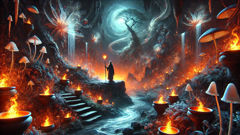Introduction
Across the deep, emerald jungles and winding rivers of the ancient Congo, tales pass from generation to generation, their words woven like vines around the heart of a people. Among these stories, none shines more brightly than the epic of Mwindo. In the land of the Nyanga, where bamboo grows tall and the earth hums with spirits, Mwindo’s legend is both a mirror and a torch—a mirror reflecting the resilience of a community and a torch illuminating the path of those who dare to dream beyond their beginnings. Born from prophecy and pain, Mwindo arrived not with the gentle cries of a newborn but with thunder in his voice and light in his hands. His father, Shemwindo, chieftain of Tubondo, saw in him not a son but an omen—a threat to his rule and pride. Thus began a journey through danger, wonder, and the hidden realms between the world of men and spirits. The story of Mwindo unfolds with the rhythm of drums echoing over the hills, each beat carrying the hope and struggle of a boy fated for greatness. Through rejection, betrayal, magic, and monsters, Mwindo’s path winds through haunted forests, mystical rivers, and celestial palaces. Every step tests his courage, every choice defines his destiny. Yet at the heart of this saga lies more than adventure; it is a story of forgiveness, wisdom, and the enduring power of perseverance—a tale still whispered by the firesides of Congo, resonating wherever courage meets adversity.
The Miraculous Birth and Rejection
In the ancient village of Tubondo, nestled beside the winding waters of the Lufuku River, life pulsed in harmony with the rhythm of the earth. The Nyanga people tilled their gardens, sang to the spirits, and honored their chieftain, Shemwindo. Shemwindo was a man of strength and pride, his will as unyielding as the river’s flow. Yet beneath the surface of prosperity lay a shadow—a prophecy that haunted the chief’s sleep: his seventh child would bring his downfall.

The chief had six wives but only one child with each—a careful design to thwart fate. But one wife, Nyamwindo, grew heavy with child for a seventh time. Fear gripped Shemwindo’s heart, and he decreed that this unborn son would never see the light of day. When labor began, Nyamwindo’s cries pierced the night, echoing through the bamboo groves. The village midwives gathered, their hands trembling as the baby emerged—miraculous, radiant, already able to walk and speak. The newborn’s first words were, “Mother, let me greet the world.”
Shemwindo’s terror grew. He ordered the child to be sealed in a drum and cast into the river. Nyamwindo wept as her son was taken, but the drum bobbed on the current, guided by unseen hands. Spirits of water and wind shielded it from harm. Days passed, and villagers whispered that a strange drum had washed ashore near the home of Iyangura, Nyamwindo’s kind-hearted sister. She lived at the edge of Tubondo, where the forest met the river. Hearing a voice within the drum, Iyangura cracked it open—and there stood Mwindo, shining with an inner light, laughter in his eyes.
The boy grew swiftly under Iyangura’s care, delighting the villagers with feats of strength and kindness. He carried a magical scepter, the conga-scepter, which glowed when danger approached and summoned the spirits of ancestors when he called. Yet even as he played among the children and healed the sick with a touch, the wound of rejection remained. Mwindo longed to know his mother and to understand why his father had cast him away. Rumors spread that Shemwindo had tried again to destroy him, sending warriors and traps, but each time Mwindo’s wit and magic saved him.
One day, as the sun dipped behind the treetops, Mwindo gazed across the river and vowed aloud: “I will go to Tubondo, not in anger, but to seek my place. Let my father see that I am not his doom, but his hope.” The spirits heard his words, and the earth itself seemed to hum in anticipation.
Trials of the Spirit World
Mwindo’s decision to return to Tubondo set in motion a chain of events that would test not only his courage but the very fabric of his spirit. Armed with his conga-scepter and a bag of wisdom inherited from his ancestors, he set out at dawn, his steps light but his purpose heavy. The path wound through tangled undergrowth and dense bamboo groves, shadows flickering as unseen eyes watched from above. The spirits of the land—some kind, others capricious—whispered his name as he passed.

When Mwindo reached the outskirts of Tubondo, he found the gates barred and warriors waiting with spears tipped in poison. Their faces betrayed both fear and awe—they knew the legends whispered about this miraculous child. With gentle words and a flash of his scepter, Mwindo disarmed their anger, vines unfurling from the earth to gently coil around their weapons. “I come not as an enemy, but as your kin,” he declared. Yet Shemwindo’s heart remained hard. The chief unleashed a barrage of magical traps: nets woven by night spirits, pits that yawned beneath Mwindo’s feet, storms that lashed the village with rain and lightning. Each trial was met with ingenuity. Mwindo sang songs that calmed the storms and called forth ancestors who danced above the pits, transforming danger into safety.
But Shemwindo was not finished. He fled deep into the underworld—Kahindo’s realm, a place where spirits drifted like mist and the laws of nature bent to the will of ancient gods. Mwindo followed, his resolve unwavering. The underworld was a place of shifting shadows and echoing voices. Rivers of fire flowed beside gardens of night-blooming flowers; beasts with glowing eyes prowled in silence. Mwindo was met by Kahindo herself, a luminous being with skin like starlight and eyes full of sorrow. She offered riddles instead of answers, warning Mwindo that forgiveness was more powerful than vengeance.
In the heart of the underworld, Mwindo confronted Shemwindo, now wracked with regret and terror. The old chief lashed out with curses and illusions, but Mwindo stood firm. He lifted his scepter and spoke not with anger, but with compassion: “Father, I do not come to destroy you. I come to mend what has been broken.” The spirits held their breath as Mwindo forgave his father, breaking the curse that had poisoned their bond. The underworld quaked, and a path opened back to the world above—a path paved with forgiveness and understanding.
Return and Reconciliation: The Birth of a New Legacy
Emerging from the underworld, Mwindo was greeted by a changed world. The village of Tubondo awaited his return, its people divided between hope and fear. Word of his deeds had spread like wildfire; elders spoke of the boy who had survived river and spirit, who had faced down the wrath of gods and demons alike. Children ran ahead, scattering petals at his feet. Women sang songs of welcome, their voices weaving through the air like morning mist.

But Mwindo did not return alone. Beside him walked Shemwindo, humbled and aged by his journey through darkness. The chief’s eyes shone with tears as he knelt before his son. “You have done what I could not,” he said softly. “You have shown mercy where I gave none.” Mwindo lifted his father gently and turned to address the people. “A village cannot stand on fear. We must build with trust and forgiveness.”
Under Mwindo’s guidance, Tubondo flourished as never before. Gardens bloomed, streams ran clear, and disputes were settled not by force, but by wisdom. Mwindo encouraged the young to dream boldly and the old to share their stories. He founded councils where all voices could be heard, blending tradition with new ideas. The conga-scepter became a symbol of unity—a reminder that true power lay not in domination, but in understanding.
As the years passed, Mwindo’s legend grew. He journeyed across the lands, teaching neighboring villages the lessons he had learned: that perseverance could bridge worlds, that forgiveness could heal even the deepest wounds. The spirits who once watched from the shadows now danced openly at festivals, their blessings sought in times of planting and harvest. Mwindo’s story was carved into the walls of the great meeting house, sung at dawn and dusk, a living heartbeat in the story of the Nyanga people.
And so, the epic of Mwindo became more than just a tale—it became a way of life, a beacon for all who faced rejection or hardship. Through his trials, Mwindo taught that even in the darkest forests and deepest rivers, hope could find a way. In every child who dares to dream, his spirit lives on.
Conclusion
Mwindo’s journey—from miraculous birth to rejection, from perilous trials to hard-won reconciliation—resonates far beyond the ancient bamboo groves of Congo. His story reminds us that greatness is not bestowed by fate alone, but earned through perseverance, compassion, and the courage to forgive. In facing what seemed impossible—betrayal by blood, supernatural obstacles, the weight of ancestral expectations—Mwindo redefined what it meant to be a hero for his people. The lessons he left behind echo in every act of kindness, every moment when understanding triumphs over anger. The epic of Mwindo endures because it speaks to something universal: our shared longing for acceptance and our power to heal even the deepest wounds. As dusk settles over the forests and the drums of Tubondo fade into the night, Mwindo’s legacy remains—a guiding star for those who seek to turn adversity into hope.













